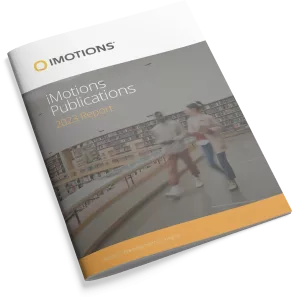-
Poker face and steady voice: Gender and reactions to emotional neutrality in crowdfunding
While emotional neutrality (e.g., maintaining a neutral face, speaking with a calm voice) can help entrepreneurs project a sought-after image of rationality, the effectiveness of such displays is context-dependent and gendered. In the emotionally resonant world of crowdfunding, the value of neutrality is ambiguous, as it may conflict with audience expectations of expressiveness. Building on […]
-
Even Better than the Real Thing: How Imperfection Shapes Trust and Engagement with Digital Humans
This study challenges the assumption that more realism in digital humans always leads to greater trust and engagement. Using eye-tracking and postexposure surveys, we compared viewer responses to three video presenters: a highly realistic digital human, a real human, and an imperfect altered human, represented by a real presenter altered to have unblinking eye contact. […]
-
Real-time Facial Communication Restores Cooperation After Defection in Social Dilemmas
Facial expressions are central to human interaction, yet their role in strategic decision-making has received limited attention. We investigate how real-time facial communication influences cooperation in repeated social dilemmas. In a laboratory experiment, participants play a repeated Prisoner’s Dilemma game under two conditions: in one, they observe their counterpart’s facial expressions via genderneutral avatars, and […]
-
Websites accessibility assessment of voivodeship cities in Poland
The aim of this study is to assess the accessibility of the websites of provincial capitals in Poland. The experiment consisted of an automated survey using five tools and an eye-tracking experiment with 15 participants. Analysis of the resultsshowed that sites with elements without contrast errors are easier to locate, which translates into shorter time […]
-
Brain Interfacing, as a Key for Improving Human–technology Integration, Cases and Implementations
The rapid evolution of global interconnection systems has catalyzed a paradigm shift in which the convergence of human cognition and technology is no longer a distant vision, but a tangible research priority. This integration offers unprecedented opportunities to enhance human comfort, extend capabilities, and improve safety in daily life. While current electroencephalogram (EEG) hardware presents […]
-
Developing an AI-driven multimodal approach to visualising resilient team performance: joint attentional engagement with gaze and speech in simulated emergency scenarios
Introduction Healthcare team performance directly impacts the quality and safety of medical care. However, measuring the performance of teams is challenging and requires methodologies to investigate different contributing elements. This study proposes an AI(artificial intelligence)-driven multimodal approach to visualising gaze (ie, joint visual attention) and speech in medical team performance and examines how these might differ […]
-
Eye Tracking Characterization of Algebraic Fraction Simplifications
Several major studies require that students understand and master the concepts and procedures of mathematics. More specifically, an area of mathematics such as algebra requires students to be able to simplify, operate with, or solve fractions. Many students entering university show numerous shortcomings and errors, especially when simplifying algebraic fractions. This is why we conducted […]
-
Eyes on Prevention: An Eye-Tracking Analysis of Visual Attention Patterns in Breast Cancer Screening Ads
Strong communication is central to the translation of breast cancer screening availability into uptake. This experiment tests the role of design features of screening advertisements in directing visual attention in screening-eligible women (≥40 years). To this end, a within-subjects eye-tracking experiment (N = 30) was conducted in which women viewed six static public service advertisements. […]
-
AI for Learners’ Emotions — A Perspective Approach of Analysis During Online Assessments
Distance learning and assessment through online platforms have emerged as a complementary approach to traditional classroom-based activities in the contemporary educational landscape. These platforms add significant value to conventional learning and evaluation methods by offering flexibility and accessibility. The increasing demand for intelligent online platforms has led to the integration of innovative techniques such as […]
-
Evaluation of Visual Behavior and Consumer Preferences of Zamorano Brand Cold Cuts in Tegucigalpa, Honduras
The decline in sales of Zamorano cold cuts in supermarkets in Tegucigalpa highlighted the need to evaluate factors that could be affecting their positioning. The purpose of this study was to identify which label attracts the most visual attention from consumers, determining areas for improvement and analyzing the factors that influence purchasing decisions. The research […]
Research Report 2024
In-depth look at the scientific landscape as powered by iMotions software, showcasing groundbreaking research and the impact of our tools in various scientific and industrial fields.
iMotions Science Resources
Looking for white papers, validation reports or research show casing iMotions Multimodal capabilities?
Share Your Research

850+ universities worldwide with an iMotions human behavior lab
73 of the top 100 highest ranked universities
710+ published research papers using iMotions
iMotions is used for some of the most interesting human behavior research studies carried out by top researchers around the world. Contact us to have your publication featured here.
The authors of these publications have used iMotions as a software tool within their research.
“Software should be cited on the same basis as any other research product such as a paper or a book; that is, authors should cite the appropriate set of software products just as they cite the appropriate set of papers” (Katz et al., 2020).
We therefore encourage you to cite the use of iMotions where appropriate.
How to cite iMotions
APA
iMotions (10), iMotions A/S, Copenhagen, Denmark, (2024).
Note: adjust the version and year where relevant.
5 Most Popular Blogs
Learn How to Conduct Human Behavior Research with iMotions
Publications
Read publications made possible with iMotions
Blog
Get inspired and learn more from our expert content writers
Newsletter
A monthly close up of latest product and research news




